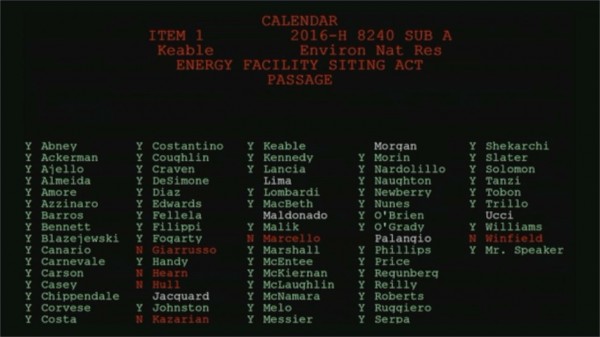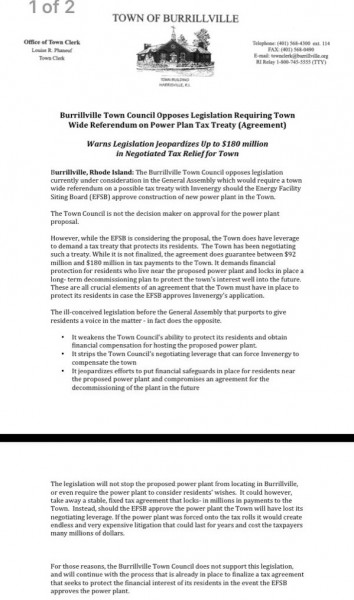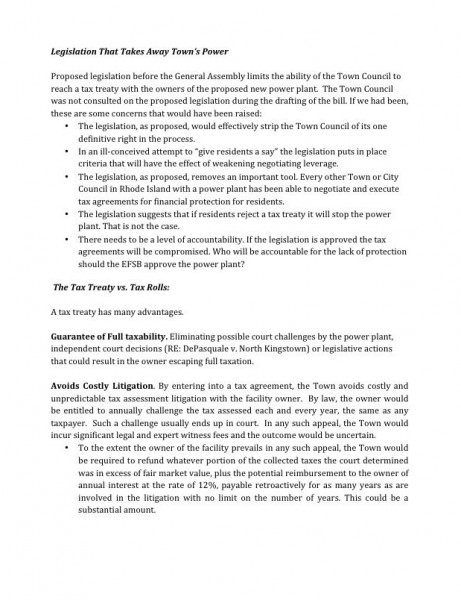
The Burrillville Town Council opposes legislation moving through the State House that would give local residents greater say on the tax agreement between the town and the proposed fracked gas power plant.
“The ill-conceived legislation before the General Assembly that purports to give residents a voice in the matter – in fact does the opposite,” said a letter released to RIPR’s Ian Donnis last night. “It weakens the Town Council’s ability to protect its residents and obtain financial compensation for hosting the proposed power plant.
The documents were released to Donnis by Dyana Koelsch, retained by the Town Council to handle public relations on their behalf. Koelsch, a former journalist-turned-public relations consultant, told me in a phone conversation last week she was retained by the Town Council to facilitate better communication between the Town Council and local residents.
The release of these documents seems to have come some time after the House passed Representative Cale Keable‘s bill, H8420 Sub A, which, if it becomes law, will allow the voters of Burrillville the opportunity to approve or reject any proposed tax treaty the Town Council makes with an power plant by popular vote. In recent days opposition to this bill has been ramping up, with Invenergy purchasing a full page ad in the Providence Journal on Saturday, an op-ed co-signed by Laurie White of the Greater Providence Chamber of Commerce and Michael Sabitoni of the Rhode Island Building and Construction Trades Council on Sunday, and a bellicose tirade on the Journal’s editorial page yesterday.
Despite the opposition of business leaders and unions the Keable bill passed the floor 64 to 7 as Burrillville residents applauded. You can watch the vote below and see the reaction of Burrillville residents below. The difference between the votes reported above and the votes pictured is due to some legislators entering their votes late.

The release of the Burrillville Town Council letter opposing the Keable bill provoked a flurry of responses on social media. At about 10:30pm Burrillville City Councillor David Place confirmed that the letter was indeed accurate when he commented on Burrillville resident and power plant opponent Jeremy Bailey’s Facebook page.

The reaction from Burrillville residents has been negative and angry:
- “I have NEVER seen such political BS in my life!!!“
- “Has to be a back room deal going on ! Obviously representing Invenergy’s interest over the citizens!!!!“
- “This is very disappointing and kicks us in the gut ! These council people are traitors and sneaky too, it’s not fair to the towns people!“
It’s unclear when the Town Council decided to write the letter, or if that decision was made at a public meeting.
The timing of the release is strange, since tomorrow evening there is a Town Council meeting scheduled, with public comment. Past Burrillville Town Council meetings have been contentious. Tomorrow night’s promises to be explosive. Why the Town Council would choose to invite the approbation of their constituents is a mystery. There is talk of a recall election for the four Town Councillors not up for re-election this fall.
The most startling thing about the documents released is that they contain details of the town’s negotiated tax deal with Invenergy, details that the Town Council has previously stated must remain secret while being negotiated. Though the tax deal is not yet done, the Town Council says there is “an agreement in principle on the following:”
- $2.9 million upfront payment – $1.2 million in guaranteed payments even if the EFSB denies the application
- $92 million – $180 million guaranteed payments over the next 20 years
- Protection for property owners near the proposed power plant site through a property value agreement
- Fully binds future owners if the plant is sold or otherwise transferred
- Protection for Town residents into the future by locking in place a decommissioning plan
The Town Council claims that the legislation weakens the Council’s ability to protect its residents and obtain financial compensation for hosting the proposed power plant, strips the Town Council’s negotiating leverage that can force Invenergy to compensate the town, and jeopardizes efforts to put financial safeguards in place for residents near the power plant and compromises an agreement for the decommissioning of the plant.
I reached out to Jerry Elmer, a Senior Attorney for the Conservation Law Foundation, overnight and he was kind enough to send me some notes on the various documents, which I will quote in full beneath the page he references.
Elmer said, in summary, “The bottom line is this: The members of the Town Council of Burrillville know, with absolute certainty, that the sweetheart deal they are negotiating with Invenergy would be overwhelmingly rejected by the voters of Burrillville if the voters of Burrillville got the right to vote on it. The members of the Town Council are correct in their assessment. That is why they are urging that the Keable-Fogarty Bill be rejected.”


From Jerry Elmer: “Document 2, page 1, bullets at the bottom: Town Council claims it has remained “neutral” on whether the plant should be built in order not to taint its comments to the EFSB. Two things must be said about this. First (and maybe more important), these documents show that the Town Council has not remained neutral, and that the Town Council very much wants to enter into a Tax Treaty with Invenergy. The Town Council is urging defeat of the Keable-Fogarty bill which would give the people of Burrillville the right to vote on such a (possible, future) tax treaty. That is not “remaining neutral.” Second, the Town Council has (very seriously) misunderstood what kind of “neutrality” is required of it by Rhode Island law. The Town Council has consistently refused to discuss the proposed Invenergy plant, even at public meetings, called pursuant to the state’s Open Meetings Act, even with a stenographer present. The Town Council pretends that this is being “neutral,” but this is merely ignoring constituents. And, crucially, this refusal to discuss the Invenergy proposal in open meetings is not required by any Rhode Island statute, law, rule, or regulation, including the state’s Open Records Act.”
From Jerry Elmer: “Document 2, page 1, bullets at the bottom: Town Council says that the purpose of the tax treaty is “to properly compensate Burrillville” if the Invenergy plant is built. However, what constitutes a “proper” level of compensation is a judgment call, about which reasonable people may disagree. The main effect of the Keable-Fogarty Bill would be to return that judgment call to the people of Burrillville.”

From Jerry Elmer: “Document 2, page 3, bullet half way down page [above], Town Council says: Having a tax treaty is a “guarantee of full taxability” of Invenergy. This is factually incorrect, and it is inconceivable to me that the Town Council is not fully aware of that fact. There is today, in the Town of Burrillville, a background, already-existing tax law that would cover this power plant (just as every municipality in Rhode Island, and indeed the United States, has an existing, background law on how to tax the real estate of individuals and businesses). The only reason that Invenergy wants a tax treaty with the Town of Burrillville is in order to get a different, lower tax rate. This makes sense: Invenergy will not negotiate with the Town for a higher tax rate; no business would do that, because it makes zero business sense. The reason that Invenergy would not negotiate for a higher tax rate is that Invenergy, without any negotiations at all, could get the currently existing tax rate. The only purpose of a tax treaty is to give the applicant (here, Invenergy) a lower tax rate than the existing one. This is true of this tax treaty, just as it has been true of every tax treaty since tax treaties were invented. In other words, when the Town Council says that a tax treaty is meant to be a “guarantee of full taxability” that statement is just factually incorrect.”

From Jerry Elmer: “Document 2, page 2, Town Council says that having a tax treaty in place “eliminates costly appraisals” and “eliminates volatility in future appraisals.” On these two points, the Town Council is speaking the literal truth, but in a deeply misleading way. These statements of the Town Council are factually accurate, but what is left unsaid is that, if the Keable-Fogarty Bill is defeated, that defeat will eliminate the right and ability of the people of Burrillville to vote on a Tax Treaty that may be reached between the Town Council and Invenergy. Let me use an analogy: I am threatening to murder you in cold blood. Before I do it, I tell you to think about the many “advantages” of being dead: you’ll save money on food, you’ll save money on rent, and you’ll never again go to a movie that you end up not liking. What I am saying is literally true, but what I am saying is misleading (in the extreme). So, too, with the Town Council statement. A tax treaty would eliminate costly appraisals — and would eliminate the right of the people of Burrillville to vote on a sweetheart deal reached between the Town Council and the people of Burrillville.”
Tomorrow the Senate takes up their version of the bill, S3037 in Senate Judiciary at 2:30pm in room 313 in the State House. The Burrillville Town Council meets tomorrow evening at 7:00pm in the Town Council Chambers, Town Building, 105 Harrisville Main St., Harrisville.








 Ahead of yesterday’s finance committee votes in both houses of the General Assembly approving RhodeWorks, the truck toll plan, a press conference was held at the Greater Providence Chamber of Commerce (GPCC) featuring some of Rhode Island’s most powerful political, business and labor leaders. They were there to present a unified message in support of the tolls, despite vocal opposition.
Ahead of yesterday’s finance committee votes in both houses of the General Assembly approving RhodeWorks, the truck toll plan, a press conference was held at the Greater Providence Chamber of Commerce (GPCC) featuring some of Rhode Island’s most powerful political, business and labor leaders. They were there to present a unified message in support of the tolls, despite vocal opposition. As I said before,
As I said before, 
